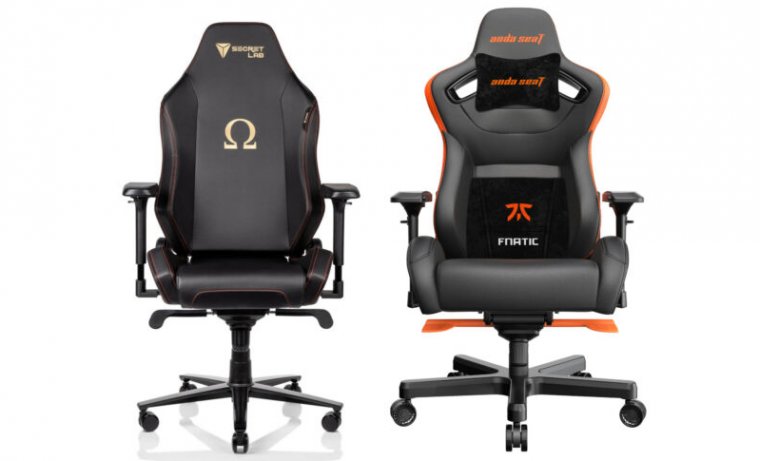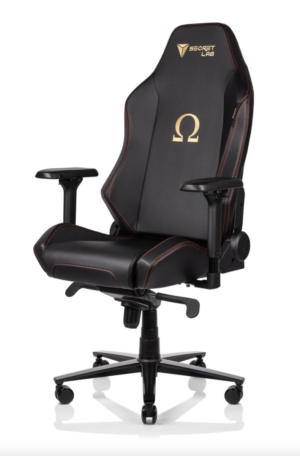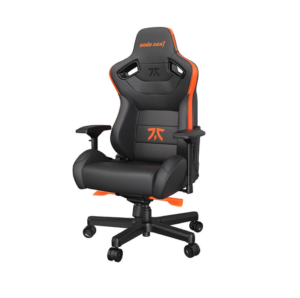Gaming chairs or work from home chairs? Ars tests two under $500

One of the most important accessories of every home office frequently gets overlooked: the chair. With this year’s COVID-19-related social distancing and mandatory remote work, many of us are spending a lot more time behind a desk at home than before—and without the right chair, that extra time can translate into discomfort or outright back pain.
I’ve never had much luck with “cheap” office chairs—a $350 mid-back office chair frequently turns into a throne of pain without sufficient extended breaks to get up and move around. Trendy Aeron chairs provide somewhat better ergonomic support for extended periods of seated work—but their $1,100 and up price tag is a little hard to swallow for many of us. This leaves the home office worker’s secret weapon—the gaming chair.
It has been my experience that you get more—and more comfortable—chair for your money when you shop for gaming chairs. They’re designed for maximum comfort and ergonomic support for long seating periods, and they’re generally designed to support larger and heavier people than office chairs are as well. And they need to do it within a reasonable budget.
When the lockdown hit the Salter household earlier this year, it wasn’t long before I knew I need a new chair—and a $1,069 Herman Miller Aeron was out of the question. After some searching online and reading user reviews at Reddit, I decided on the $420 Secretlab Omega. Not long after my purchase arrived, Anda reached out to ask me to review its $450 Fnatic—which worked out well, since I have one downstairs office (for escaping my kids to work) and one upstairs office (for working, but staying accessible to the kids).
Secretlab Omega
-
The dire warning about not touching the lever had me a bit on edge—what they don’t tell you is there’s a locking bolt keeping it from moving anyway.Jim Salter
-
The presentation on this little assembly toolkit is fantastic—but the Allen wrench doesn’t provide enough leverage, and I had to go fetch my own.Jim Salter
-
The provided Allen wrench (bottom) only fits these bolts from the long axis, as shown—the other tip is sized for differently-sized bolts.Jim Salter
-
This locking bolt secures that seatback adjustment lever we were warned not to touch. Wish they’d said so to begin with!Jim Salter

Secretlab Omega (2020 Series)
When you first open the Omega’s shipping container, you’re presented with perfectly sized and shaped foam blocks with neat cutouts for every part of your new chair, and an equally neatly presented little toolkit to assemble it with. The assembly instructions are printed in full color, with photographs, in a single, large poster-sized sheet.
The assembly process itself is a bit hectic, particularly if—like I did—you’re assembling the chair without a helper. There are rather dire warnings about not moving the seat back adjustment lever prior to fully assembling the chair—these had me more on edge than I needed to be; at the very end of the instructions you discover that the lever in question was completely secured with a locking bolt. If you don’t go out of your way to do things out of order, you’ll be fine.
There were, however, a couple of real problems with the assembly—it required a pretty Herculean effort to get the back crammed tightly enough against the seat to bolt the two together, and the Allen wrench provided for the task turned out to be inadequate. The two sides of the Allen wrench are sized differently, and the bolts that only fit its long axis needed more torque than I could give them—I ended up needing to use my own set of Allen wrenches to properly secure the seatback to the seat base.
Aside from those issues, assembly was relatively straightforward.
-
Secretlab Omega is a high quality, no-nonsense chair—the pseudo-leather looks and feels very good, and the padding is incredibly firm.Jim Salter
-
I appreciate the Omega’s low-key styling. It looks much less out of place in an office setting than most gaming chairs do.Jim Salter
-
Build quality is extremely good on the Omega. Nothing rattles, shakes, or feels flimsy.Jim Salter
-
The branding on the rear of the Secretlab chair is a bit more brash than on the front.Jim Salter
Once assembled, the Omega blew me away from the moment I sat in it. The pseudo-leather has a very fine, low-lying grain and looks and feels very high quality. The padding is incredibly firm—the chair feels very much like the driver’s seat of an expensive sports car. There was no hint of rattle or looseness in the chair itself or its casters when rolling it out of the carport, down the sidewalk, and then carrying it into the house.
One word of warning: both of these chairs are heavy. Office chairs typically weight in at about 25-35 pounds—the Secretlab Omega weighs 66 pounds, and the Anda Fnatic we’ll cover in the next section weighs 72 pounds. Having a partner available to help lift and carry as necessary makes life a lot easier, especially if you’ve got stairs to navigate.
Anda Fnatic
-
Presentation in the box is not something Anda cares about—”it’s all crammed in there good enough.”Jim Salter
-
Instead of a big assembly poster, Anda went with the more traditional booklet, with two steps shown per page.Jim Salter
-
Continuing a trend, Anda’s toolkit isn’t attractively packaged—it’s stuck inside pasteboard-backed blister packaging—but it actually works better than Omega’s did.Jim Salter
-
These dust covers were the one unhappy part of assembling Anda Fnatic. They don’t seem to fit the chair, until you realize they literally deform to fit under pressure from their bolt.Jim Salter

Anda Seat Fnatic Edition
Opening the box for Anda Fnatic doesn’t have the same “wow factor” that it did for Secretlab Omega. The packaging presentation is best described as “it’s all crammed in there just fine,” and there are no fancy foam blocks with custom cutouts or custom boxes for the tools provided.
However, the actual assembly process for Fnatic is much smoother and easier. The traditional assembly booklet, with only two steps per page, is much easier to follow. There are no dire warnings about pieces you mustn’t touch, all the bolts are the same size, and the included Allen wrench provides plenty of leverage to tighten them properly.
There also wasn’t a struggle to squash the seatback against the base while bolting them together; for the most part, this installation was very smooth. The only hassle I had involved the little plastic dust covers, which cover the bolts on the side of the chair. They don’t seem to actually fit the chair at all—and that’s because, technically, they don’t.
It seems as though the dust covers should snap onto the sides of the chair, then get secured with a single bolt apiece. In reality, they don’t snap on—they don’t even fit—until the bolt is tightened down fully, which deforms the soft plastic cover to lie flat against the side of the chair. Once you figure that out, the dust covers are fine—but figuring that out took a while, and I suspect more than one Fnatic owner has probably given up on the dust covers and just thrown them away.
-
Anda Fnatic is a lot funkier looking than the Secretlab Omega. Most of that apparent funk turns out to be for good reason after you’ve spent time with it.Jim Salter
-
Both Fnatic and Omega came with neck pillow and lumbar pillow. On the Omega they seemed weird and unnecessary; on the Fnatic they fit much better.Jim Salter
-
The Fnatic has a much more interesting profile. My kids love the bold orange-on-black color scheme.Jim Salter
-
The rear view of the Anda Fnatic is a little less gamer-y obnoxious than the rear view on the Secretlab Omega.Jim Salter
Once assembled, the Fnatic didn’t give me the same “wow factor” that the Omega had. Its pseudo leather upholstery has a rougher, more raised grain that’s easily visible and reminded me of a basketball’s. The padding, while thick and very comfortable, isn’t as firm as that on the Omega. And there was some noticeable rattle from the casters and from the chair’s arms as I rolled it down the sidewalk to the front door.
On the plus side, the through-holes at the top of the chair give excellent mounting for the included neck pillow—and the chair’s own design makes that pillow more practical than the Omega’s does, with a more pronounced curvature to the chair back. The lumbar pillow also feels more like an integral part of the Fnatic, where the Omega’s seems like an afterthought.
As with the Secretlab Omega, this is a heavy chair—at approximately 72 pounds, it’s twice or more the weight of a typical office chair. Consider having a helper available to move it once assembled, especially if you’ll need to carry it up or down stairs.
Conclusions
These are both excellent chairs, although they’re quite different in look and feel. For the first week or so, I greatly preferred the Secretlab Omega, with its understated good looks, fine-grained covering, and ultra-firm padding. But after several weeks of use, the orange-and-black Fnatic grew on me—it’s now my favorite chair.
Although the Fnatic is a little loose and rattly in construction compared to the Omega, it’s significantly more comfortable—especially for long seating periods. Sitting for too long in the Omega without a break can result in red lines on your thighs if you’re wearing clothes that bunch. That’s not ever a problem in the Fnatic, which stays comfortable for hours on end—even if you forget (or refuse) to get up and take hourly breaks.
We should also talk about suggested height and weight limits for each chair. Secretlab Omega is designed for people from 5’3″ to 5’11” and 240 pounds. If you’re taller than 5’11”, you’ll probably want to upgrade to the more expensive Titan (up to 6’7″ and 290 pounds, for $460) or Titan XL (up to 6’10” and 390 pounds, for $540).
Anda Fnatic is designed for people from 5’10” to 6’10” and supports up to 330 pounds (recommended) or 440 pounds (maximum). Smaller folks may be better off with the Omega—its relatively straight back makes it more forgiving for people who aren’t tall enough to reach the top of the headrest. But people tall enough to fit it properly will appreciate the Fnatic’s deeper spinal curvature and better-integrated neck and lumbar pillows.
https://arstechnica.com/?p=1715055